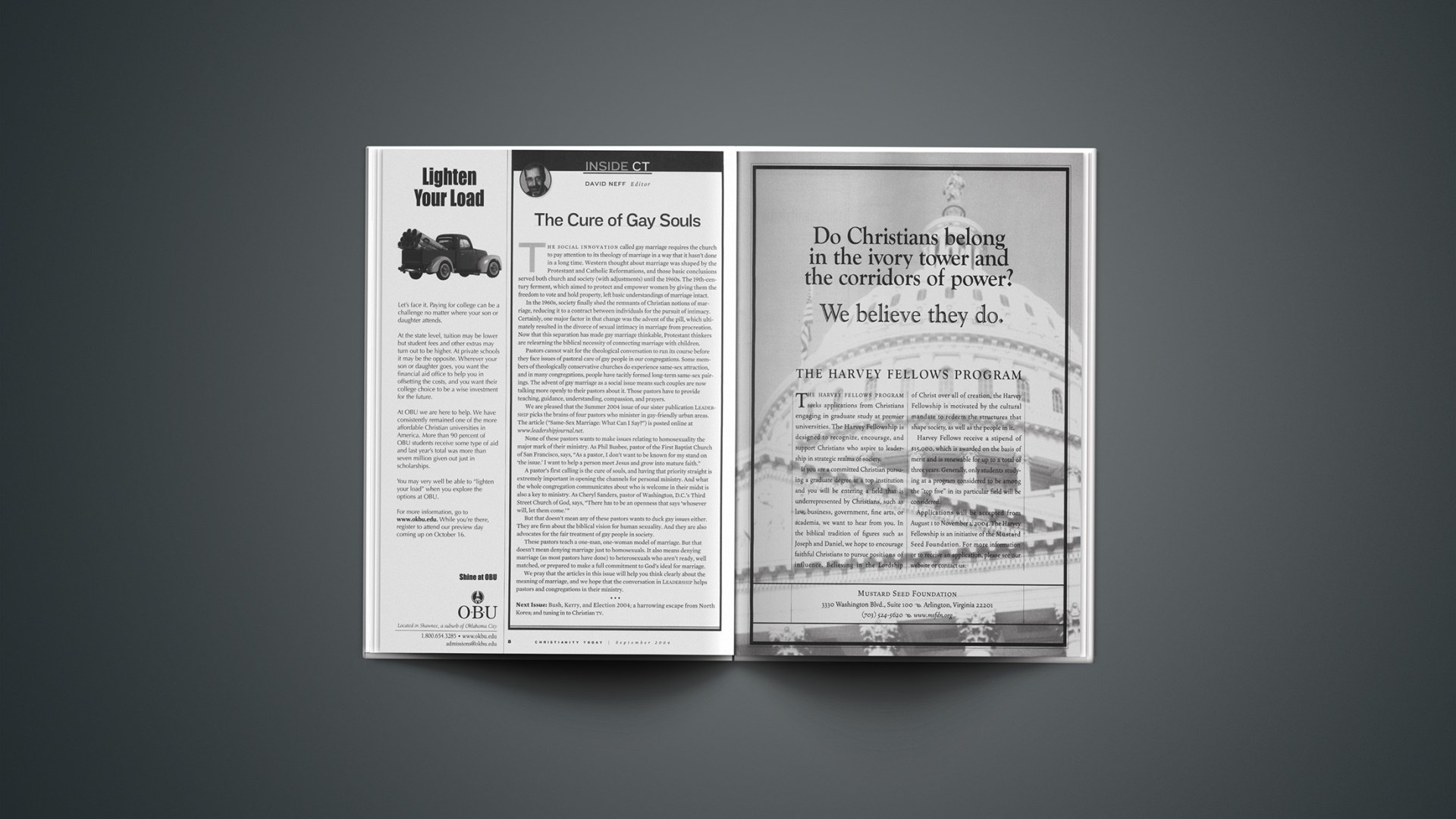The social innovation called gay marriage requires the church to pay attention to its theology of marriage in a way that it hasn’t done in a long time. Western thought about marriage was shaped by the Protestant and Catholic Reformations, and those basic conclusions served both church and society (with adjustments) until the 1960s. The 19th-century ferment, which aimed to protect and empower women by giving them the freedom to vote and hold property, left basic understandings of marriage intact.
In the 1960s, society finally shed the remnants of Christian notions of marriage, reducing it to a contract between individuals for the pursuit of intimacy. Certainly, one major factor in that change was the advent of the pill, which ultimately resulted in the divorce of sexual intimacy in marriage from procreation. Now that this separation has made gay marriage thinkable, Protestant thinkers are relearning the biblical necessity of connecting marriage with children.
Pastors cannot wait for the theological conversation to run its course before they face issues of pastoral care of gay people in our congregations. Some members of theologically conservative churches do experience same-sex attraction, and in many congregations, people have tacitly formed long-term same-sex pairings. The advent of gay marriage as a social issue means such couples are now talking more openly to their pastors about it. Those pastors have to provide teaching, guidance, understanding, compassion, and prayers.
We are pleased that the Summer 2004 issue of our sister publication Leadership picks the brains of four pastors who minister in gay-friendly urban areas. The article (“Same-Sex Marriage: What Can I Say?”) is posted online at Leadership Journal.
None of these pastors wants to make issues relating to homosexuality the major mark of their ministry. As Phil Busbee, pastor of the First Baptist Church of San Francisco, says, “As a pastor, I don’t want to be known for my stand on ‘the issue.’ I want to help a person meet Jesus and grow into mature faith.”
A pastor’s first calling is the cure of souls, and having that priority straight is extremely important in opening the channels for personal ministry. And what the whole congregation communicates about who is welcome in their midst is also a key to ministry. As Cheryl Sanders, pastor of Washington, D.C.’s Third Street Church of God, says, “There has to be an openness that says ‘whosever will, let them come.’ “
But that doesn’t mean any of these pastors wants to duck gay issues either. They are firm about the biblical vision for human sexuality. And they are also advocates for the fair treatment of gay people in society.
These pastors teach a one-man, one-woman model of marriage. But that doesn’t mean denying marriage just to homosexuals. It also means denying
marriage (as most pastors have done) to heterosexuals who aren’t ready, well matched, or prepared to make a full commitment to God’s ideal for marriage.
We pray that the articles in this issue will help you think clearly about the meaning of marriage, and we hope that the conversation in Leadership helps pastors and congregations in their ministry.
Next Issue: Bush, Kerry, and Election 2004; a harrowing escape from North Korea; and tuning in to Christian TV.
Copyright © 2004 Christianity Today. Click for reprint information.
Related Elsewhere:
The same-sex marriage debate is this month’s cover story, “What God Hath Not Joined.”
“Same-Sex Marriage: What Can I Say?” is available from Leadership.
Christianity Today‘s past coverage of the gay marriage debate includes:
The Next Sexual Revolution | By practicing what it preaches on marriage, the church could transform society. (Aug. 27, 2003)
My Two Dads? Not in Florida | U.S. Circuit Court upholds ban on gay adoption (March 11, 2004)
Speaking Out: Why Gay Marriage Would Be Harmful | Institutionalizing homosexual marriage would be bad for marriage, bad for children, and bad for society. (Feb. 19, 2004)
Let No Law Put Asunder | A constitutional amendment defending marriage is worth the effort. (Jan. 26, 2004)
Massachusetts Court Backs Gay Marriage | Christians say gay activists will overturn marriage laws (Dec. 10, 2003)
‘AMan and a Woman’ | Activists say the Federal Marriage Amendment will be the defining issue in the next election. (Nov. 24, 2003)
The Marriage Battle Begins | Profamily and gay activists agree: Texas decision sets significant precedent. (Aug. 11, 2003)
Canada Backs Gay Marriages | Conservatives say decision could put pressure on dissenting churches. (July 16, 2003)
Marriage in the Dock | Massachusetts case on gay marriage could set off chain reaction. (April 25, 2003)
Christian Conservatives Split on Federal Marriage Amendment | Law would protect marriage from courts, but legislatures could still extend marital benefits to same-sex unions. (July 20, 2002)
Defining Marriage | Conservatives advocate amendment to preserve traditional matrimony. (October 1, 2001)
No Balm in Denver | Episcopalians defer debate over same-sex blessings for another three years. (July 17, 2001)
Marriage Laws Embroil Legislatures | New Englanders push for domestic-partner benefits. (April 26, 2001)
Presbyterians Propose Ban on Same-Sex Ceremonies | Change to church constitution, which passes by only 17 votes, now goes to presbyteries. (July 5, 2001)
Sticking With the Status Quo | United Methodists reject gay marriage, ordination. (May 15, 2000)
Presbyterians Vote Down Ban on Same-Sex Unions | Opponents say vague wording led to defeat. (March 29, 2001)
States Consider Laws on Same-Sex Unions California to vote on ‘limit on marriage’ in March (Jan. 10, 1999)
Presbyterians Support Same-Sex Unions (Dec. 10, 1999)
Pastor Suspended in Test of Same-Sex Marriage Ban (Apr. 26, 1999)
Same-Sex Rites Cause Campus Stir (Aug. 11, 1997)
State Lawmakers Scramble to Ban Same-Sex Marriages (Feb. 3, 1997)
Clinton Signs Law Backing Heterosexual Marriage (Oct. 28, 1996)










